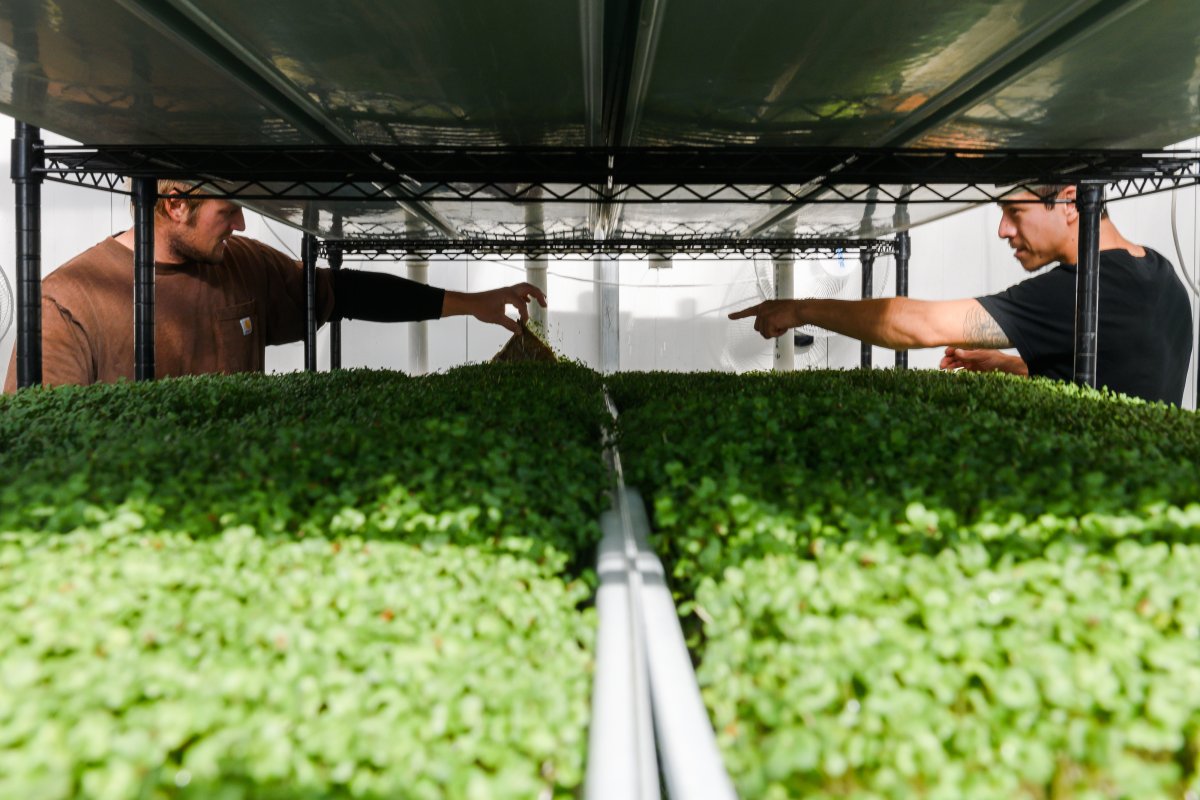Note from this newsletter’s usual author: After meeting Roberto Meza at this 528-person dinner table, I connected him to my colleague Parker Yamasaki to dig into how his little farm in Bennett became a founding leg of the East Denver Food Hub and more. Enjoy! ~ tamara
Roberto Meza doesn’t need to close his eyes to visualize a changing food system anymore, he’s watching it happen week to week. The latest evidence: 600 containers of microgreens delivered to the Aurora Public Schools for the district’s “Farm Fresh Fridays” program.
“That is awesome,” Meza said. “What once was just a garnish in upscale fine dining is now replacing lettuce for students. They get way more nutrition and crunch and flavor. Now I know that’s possible. The goal is to replicate it.”
When Meza talks about changing the food system, he really means the whole system, including government subsidies that drive prices and guide institutional decision-making. Decisions like what schools are going to feed students.
The Colorado Sun first visited Meza and his cofounder, David Demerling, five years ago, as the two fresh-eyed, first generation farmers were gaining traction with their microgreen farm, Emerald Gardens.
Then the pandemic ripped through the restaurant industry. Until that point, Emerald Gardens was sustained by the food industry, so Meza and Demerling shifted their focus. They’d always had an eye on social justice and food equity, but the sudden vulnerability kicked them into high gear.
Filling the food system gaps
It started with food boxes for shelters and WIC recipients — a federal program that subsidizes healthy food for women, infants and children.
They prototyped the program in a shipping container on their land, and quickly realized “this is a whole separate thing,” Meza said. In March 2021, they moved into a 14,000-square-foot warehouse in northeastern Denver and opened the East Denver Food Hub.
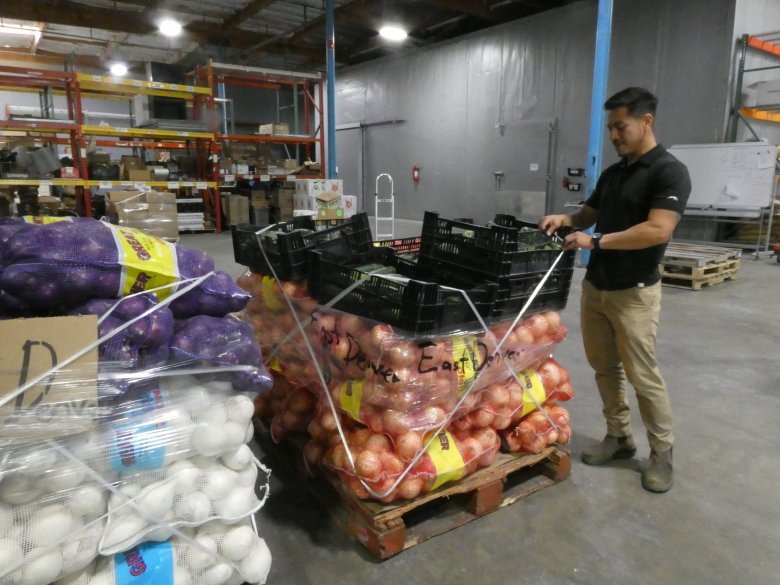
A “hub” is the perfect way to describe their venture. The warehouse is currently a headquarters for three food supply businesses: Meza and Demerling’s Food Hub, their new nonprofit, the Ag and Food Lab, and a Mexican grocery store distributor, Altitude Produce. There are also rows of shelves reserved for Ela Family Farms, a back wall used by Ekar Farm, a room stacked high with sacks of beans (about 100,000 pounds by Meza’s estimate, from a farmer in Boulder), and a side room occupied by the Village Exchange Center.
“It’s kind of like this food ecosystem,” Meza said, standing in the middle of the warehouse, while two men loaded pallets of onions into the back of a semitruck. “That’s partly what has allowed us to understand the full food system so well. So our work moves forward through the gaps that we see.”
When they started the Food Hub in 2021, that gap was connecting underserved populations to fresh food. The U.S. Department of Agriculture noticed this gap too, and in December of that year authorized more than $400 million in American Rescue Plan Assistance, or ARPA funds, for states to procure local food —food grown within 400 miles — for underserved communities. The USDA strongly encouraged states to spend their funds on “socially disadvantaged producers,” which they defined as a group whose members have been discriminated against due to race, sex, age, disability or a number of other factors.
Colorado was the first state to sign onto the federal program, a mouthful known as the Local Food Purchase Assistance Cooperative Agreement Program, or LFPA for short. The state received nearly $4 million in funds during the first round of handouts. As the program expanded over the past two years, the federal government sent out close to $900 million total, and Colorado received close to $12 million.
Those funds were distributed to 34 applicants in the state and have been used to purchase food from over 100 local producers. The money also had a huge impact on places like the East Denver Food Hub, which received funds directly and through the purchases by food banks and shelters that received LFPA money.
But the funds are set to expire in April 2025, and according to the Colorado Department of Human Services, there is currently no way to continue the program.
“We don’t have a pandemic, but we didn’t solve hunger”
With the federal funds receding, Meza and Demerling are getting ready to pivot, again.
“We don’t have a pandemic, but we didn’t solve hunger,” Meza said. “What we learned during that time is that local procurement, investing in local infrastructure and workforce development, that’s how you solve hunger. It’s not just through donations of food.”
Meza envisions a system that addresses food insecurity and equity while also accounting for the health of “all beings” along the supply chain, he said. But that requires a big shift in cultural attitudes toward food and a heavy lift from government subsidies. It’s a project that the LFPA started, but it still has a long way to go.
“Whether we like it or not, we’re competing against a highly subsidized industrial food system,” Meza said. “It operates on low costs at the expense of labor practices, sustainable operations and animal welfare.”
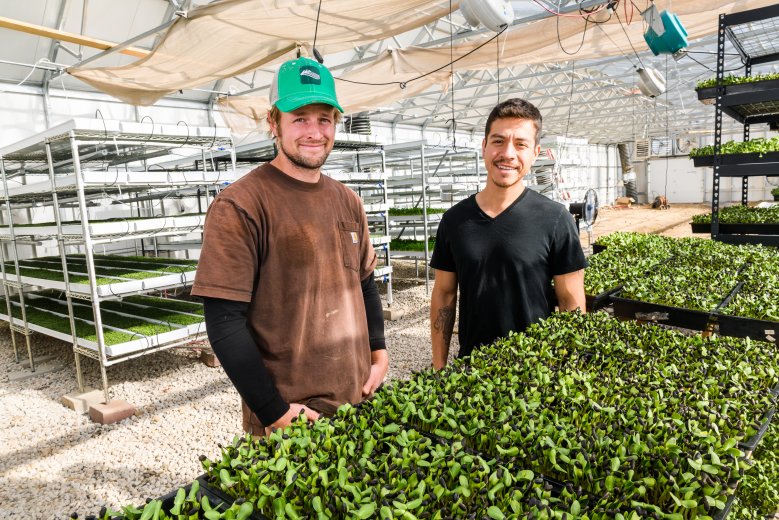
In fall 2023, Meza and Demerling founded a nonprofit organization, the Ag and Food Lab, to help new farmers incubate their businesses. The farmers work on the Emerald Gardens land in Bennett and receive infrastructure and business help through the Lab. When the crops are ready to go, they become part of East Denver Food Hub’s procurements, heading out to pantries, shelters, schools and hospitals, as well as high-end restaurants like The Wolf’s Tailor, which received one of Colorado’s first Michelin stars last year.
Farming can be isolating, Meza said, and part of the incentive for starting the lab was to make sure new and immigrant farmers have a support network and access to chefs who can showcase their products.
But it is also about economics. When Meza and Demerling shifted from solely growing microgreens to running a full food hub, they focused largely on food justice initiatives. And the initiatives, “as necessary as they are, can’t affect our bottom line,” Meza said.
“The world is not prepared for the food system that we’re practicing, so we kind of have to do both at the same time,” he said, about operating for-profit and nonprofit businesses alongside each other. “This is our time to really rebuild the foundation. And there’s no reason why we can’t adjust our economics to accommodate that, knowing that it’s actually going to benefit everybody.”
If you’ve benefited from the LFPA, or know producers or distributors that are working to make local food more accessible, please email Parker at parker@coloradosun.com.
Sun economy stories you may have missed
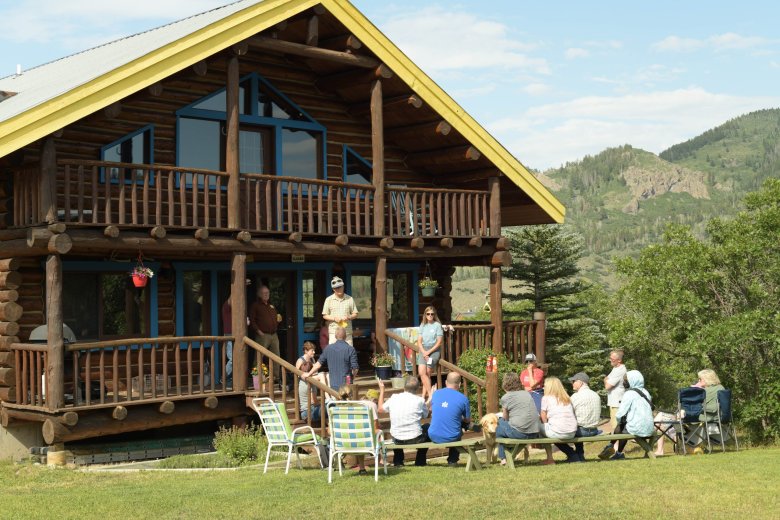
➔ The Colorado community of Stagecoach is paradise to its residents. A luxury resort could turn it upside down. The same developers that turned Big Sky, Montana, into a resort town for billionaires are moving ahead with plans to bring luxury homes and a golf course to northwestern Colorado. Those who live there are raising concerns. >> Read story
➔ A new Colorado hospital opens this weekend. It’s built with the lessons of COVID in mind. Lutheran Medical Center is moving from its longtime home in Wheat Ridge to a new campus near Interstate 70 and West 40th Avenue. >> Read story
➔ Alarming reports about PERA’s finances spark questions about future of the state’s pension. A legislative oversight panel is considering whether to recommend further reforms to the Colorado Public Employees’ Retirement Association. >> Read story
➔ Colorado water officials dream big, team up after feds drop $450 million for water projects. The surge of funds paves the way for large, multibenefit projects addressing drought and water conservation in Colorado, New Mexico, Utah and Wyoming. >> Read story
Got some economic news or business bits Coloradans should know? Tell us: cosun.co/heyww
Other working bits
➔ Denver’s minimum wage increasing to $18.81 in January. The city of Denver just released how much its minimum wage is going up in 2025: 52 cents. That’s 2.8% higher than the existing $18.29. While this is expected because the city’s wage is based on inflation, this also translates into a 69.5% increase since 2019, when Denver broke away from the state to set its own minimum wage. Colorado’s wage next year is set to go up as well, though officials have not announced the new amount. It’ll likely be similar to Denver’s increase, which would put Colorado’s minimum wage in 2025 at around $14.82 an hour. >> Denver’s wage update
➔ Denver airport traffic up 9.2% in first six months of 2024. Numbers-wise, that translates into 39,937,380 passengers who came, went or just passed through Denver International Airport, aka DEN. Each month also set a record, airport officials said. International traffic also grew, up 17.2% compared with the same period a year ago. But DEN does expect growth to slow for the rest of the year because it may be hard to top 2023’s huge travel year (remember the passport delays that even had a Colorado senator asking for answers?). Based on the first five months of this year, Denver ranked as the nation’s third busiest airport by the Airports Council International, and sixth busiest in the world.
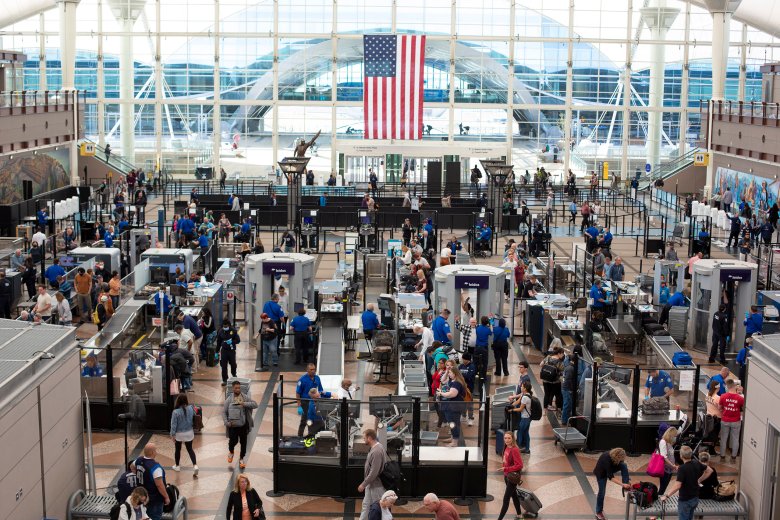
➔ LinkedIn’s Reid Hoffman headlining Denver’s AI event. The upcoming DenAI Summit, a first city-led conference on artificial intelligence, just named more speakers who will be at the Sept. 19 event at the Colorado Convention Center. Besides Hoffman, who will join Denver Mayor Mike Johnston in a fireside chat, there’s also Phaedra Ellis-Lamkins, CEO of Promise, a California payment processor for utilities and governments, and two CEOs from Denver companies: Bryan Leach, with retail app Ibotta, and Bijal Shah, with Guild, which connects everyday workers to educational opportunities. >> Details
➔ Disaster prep? SBA shares guide for small businesses. The guide includes best practices and templates to help small business owners plan and recover from disasters. >> Find it here
➔ Want to paint a mural along Denver trails? Denver Parks & Recreation has an open call for mural artists to paint something cool along the city’s trail system. Three artists will be chosen based on how they’d interpret Denver’s natural resources when it comes to water, urban forest, landscape transformation, habitat protection and environmental stewardship. Commissions pay $6,000 each. Submit a proposal by Aug. 25 because the installations start “Summer/Fall 2024,” which is … now! >> Details at denvergov.org/nature
Thanks for sticking with me for this week’s report. Remember to check out The Sun’s daily coverage online. As always, share your 2 cents on how the economy is keeping you down or helping you up at cosun.co/heyww. ~ tamara
Miss a column? Catch up:
What’s Working is a Colorado Sun column about surviving in today’s economy. Email tamara@coloradosun.com with stories, tips or questions. Read the archive, ask a question at cosun.co/heyww and don’t miss the next one by signing up at coloradosun.com/getww.
Support this free newsletter and become a Colorado Sun member: coloradosun.com/join

The Colorado Sun is part of The Trust Project. Read our policies.
Corrections & Clarifications
Notice something wrong? The Colorado Sun has an ethical responsibility to fix all factual errors. Request a correction by emailing corrections@coloradosun.com.

